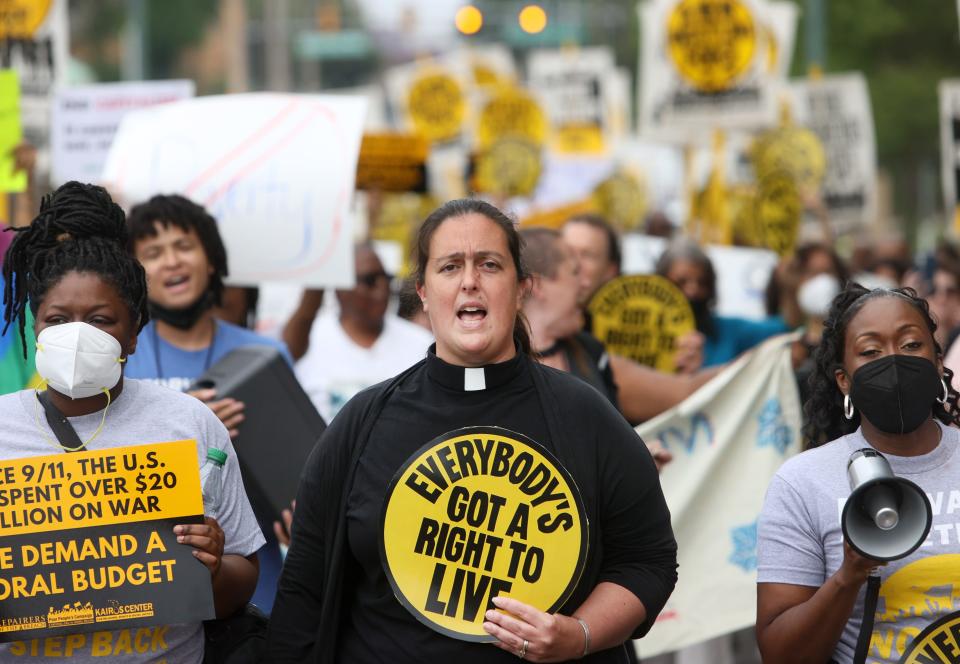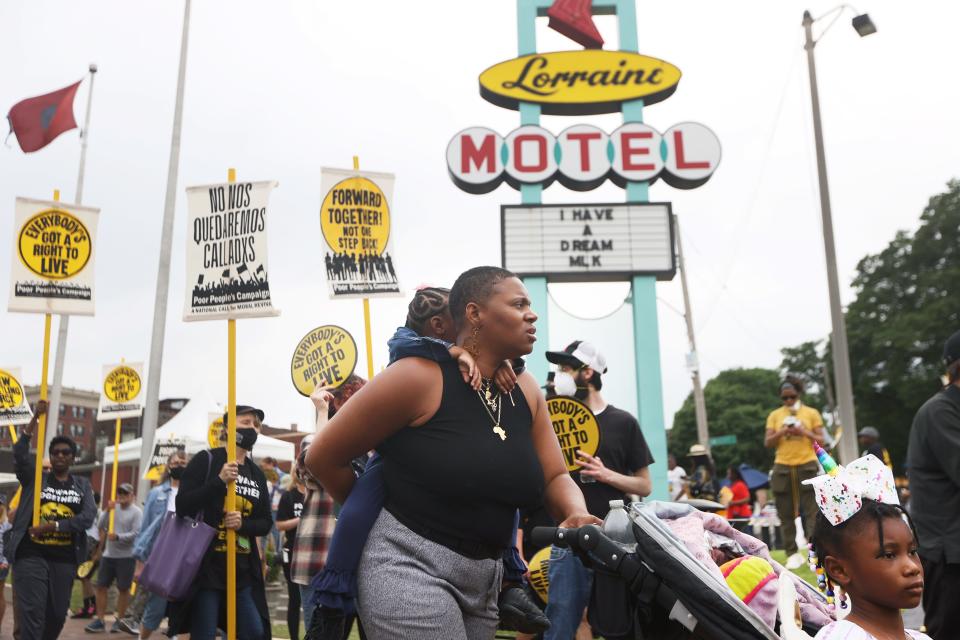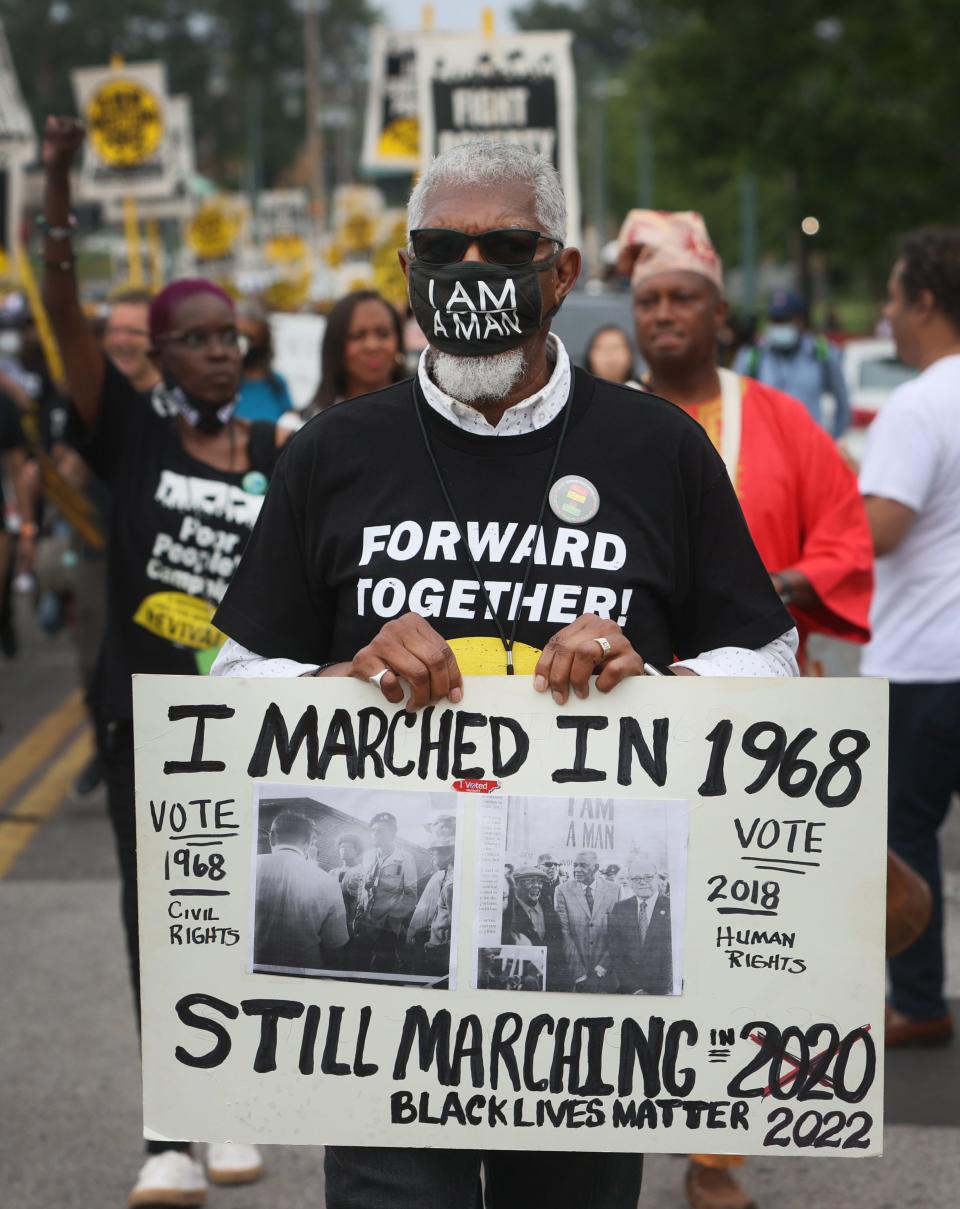'We don't need nostalgia': Poor People's Campaign marches through Memphis
A small horse-drawn buggy led more than 200 people from Robert R. Church Park to the National Civil Rights Museum. Marching in pairs, the group stretched over half a mile long and people in the apartments and houses along the march route stepped out onto their porches to watch the line walk by.
"Ain't gonna let nobody turn me 'round, turn me 'round, turn me 'round, Ain't gonna let nobody turn me 'round I'm gonna keep on a walkin', keep on a-talkin', Marching up to freedom land," the Poor People's Campaign sang as they walked.
Memphis is the last stop of the Poor People's Campaign's latest mobilization tour before its march in Washington, D.C., on June 18. The campaign and march, called the Poor and Low-Wage Workers Mass Assembly and March on Washington and to the Polls, demands voting rights, laws for living wages, housing and access to affordable health care.

"It's time for impacted people to be heard, for their voices to be lifted up," the Rev. William Barber, who co-chairs the campaign with the Rev. Liz Theoharis, a pastor from New York City, said. "...the voices that are going to be lifted up are going to be poor and low wealth people, religious leaders and advocates, mainly for poor and low wealth people."
Members of the "Starbucks Seven," seven workers at a Memphis Starbucks location who were fired in February in the midst of unionizations efforts, marched in front of the line.
'MAKES ME WANNA HOLLER': Why Memphis is last stop of latest Poor People's Campaign tour
JOBS: Memphis area recovers all jobs lost in COVID-19 pandemic, hits record-high employment
Barber, a pastor from North Carolina, spent a large part of Monday driving through the mountains to make it to the Memphis march and rally after his planned flight into the city was canceled Sunday night.
"We organize from Appalachia to Alabama, from Mississippi to Maine, from California to the Carolinas," Barber said. "We're not a Black movement or White movement, we're all people who come out of the 140 million poor or low wealth people in this country."
Jannie Foster, an evangelist from Church of God in Christ, remembers marching in Memphis and down Pontotoc Street in the 1960s. What are now well-kept apartments used to be "shanties," she said.

Foster had a son in the 1968, the same year Dr. Martin Luther King Jr. was assassinated at the Lorraine Motel in Memphis. Her son went on to graduate from Rhodes College and Dartmouth. Her granddaughter is at Harvard, on an all-expenses-paid scholarship. It's why Foster continues to march, she said.
"We've got to have opportunities," Foster said. "You don't know who can do what."
The march was greeted at the National Civil Rights museum by a band playing in front of the Lorraine Motel. The museum opened the traveling exhibition "Solidarity Now! 1968 Poor People’s Campaign" last Saturday. The installment explores the "often-overlooked history of the multicultural movement that confronted poverty and redefined social justice and activism in America."
"We don't need nostalgia," Barber shouts from the stage, marchers from Tennessee, Mississippi, Arkansas and Kentucky standing behind him. "We need a resurrection."
Memphis'' status as the last stop before Washington, D.C,. is a reflection of the work that still needs to be done in the city and in the state, Barber said, not a reflection of the history the city has seen.

"We're here because, you look at what's happening now, in this state alone, you've got 47 percent of the people in Tennessee that are poor or low wealth," Barber said. "That's over three million people. 50 percent of the children are poor or low wealth. 48 percent of women. 61 percent of people of color and 41 percent of white people but in Tennessee, that's a million more than Black people. So in Tennessee, the majority of poor people are white and women. And our movement embraces all of that."
"Too many people have been hurt and quiet for far too long and what we're saying is we're not going to be silent any longer," Barber said. "Tomorrow we're going to be on the strike line in Hattiesburg, coming back to Memphis to be with Dollar General workers, headed up to Lancaster, headed down to South Carolina to be on the strike line and then we're headed for DC."
The campaign has four goals, Barber said. The first is to shift the moral narrative, from narratives such as liberal vs. conservative to a narrative that concentrates on establishing justice. The second is to put a face to the people living in poverty. The third and fourth goals are to build power among the poor and low wealth people and to put before the nation a reconstructive agenda that concentrates on things like access to healthcare, living wages and access to water.
"We don't have any interest in doing no more commemorations," Barber told the crowd. "That's part of the problem. We don't need any more commemorations, we need reengagement. We don't need to keep talking about crucifixions, we need to start having some resurrections."
Gina Butkovich covers DeSoto County, storytelling and general news. She can be reached at 901-232-6714 or on Twitter @gigibutko.
This article originally appeared on Memphis Commercial Appeal: The Poor People's Campaign marches through Memphis
